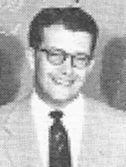Zisch (original) (raw)

Home - Search - Browse - Alphabetic Index: 0- 1- 2- 3- 4- 5- 6- 7- 8- 9
A- B- C- D- E- F- G- H- I- J- K- L- M- N- O- P- Q- R- S- T- U- V- W- X- Y- Z
Zisch, William E 'Bill'
American business manager of Aerojet, 1942-1966. No college degree or scientific training, but he led Aerojet from five employees to $700 million annual sales of JATO, Polaris, Aerobee, Delta, Titan, Apollo SPS, M-1 and Nerva rocket engines.
Born: 1917-12-15. Died: 1998-11-10. Birth Place: Johnstown, Colorado.
William E Zisch grew up in the small town of Johnstown, Colorado, where his father was Chief Chemist at the Great Western Sugar Company's plant. Bill was tall and considered handsome, and had a cousin who had just started in Hollywood (Henry Fonda). So just after high school graduation, in the summer of 1935, he and a friend drove a car they had pieced together from junked autos and headed for Los Angeles. In the absence of any experience, Zisch's film aspirations were dashed after a couple years, and he ended up looking for more practical work. An article by Walter Chrysler in Reader's Digest suggested that more young men should enter the secretarial profession, since most executives would prefer a man rather than a woman as an assistant.
Zisch started in a secretarial school, and early on was sent to Caltech for a mock job interview as part of the training. However he so impressed Caltech that he was instead hired in 1938 as secretary to Theodor von Karman and Clark Millikan, the preeminent aerodynamicists in the United States. While working there, Zisch enrolled in Caltech and attempted to earn a degree at this, the most demanding engineering and physics school in the nation, but was unable to graduate.
Von Karman, with four associates, an $8,700 investment, and five employees, set up the Aerojet Engineering Corporation in Azusa, California in 1942. The impractical scientists that made up the company desperately needed a practical hand, and on 18 November 1942, at age 24, Zisch became Aerojet's full-time business manager. Aerojet's first commercial product were JATO units, used to boost over-laden aircraft off runways in shorter take-off runs.
The wartime Navy and Air Force flooded Aerojet with orders. Within 18 months, after six government loans to expand, it still needed more cash. Von Karman was told by the Pentagon that in order to become a full-fledged part of the military-industrial complex, Aerojet would have to find a major corporate sponsor and hire some experienced management with good ties to Washington. The General Tire and Rubber Company took over control of the small company in 1945, and brought in Dan Kimball and Art Rude to run the business side of things. By the end of the war Aerojet had produced over 10millionworthofJATOs,atacostof10 million worth of JATOs, at a cost of 10millionworthofJATOs,atacostof185 per bottle.
After a post-war slump, the Cold War kick-started Aerojet's growth. By 1951 the company had a 25millionbacklogandhadfinishedpayingoffits25 million backlog and had finished paying off its 25millionbacklogandhadfinishedpayingoffits10 million plant at Azusa. It had already bought 7,200 acres 16 miles east of Sacramento to build a second $6 million production plant. By this time, Zisch, at age 33, was General Manager.
At age 45, Zisch succeeded Kimball as the Chief Executive of Aerojet. As Time magazine noted, this was unusual for someone with no college degree, no formal scientific education, and who had begun as a secretary. By that time Aerojet was making $700 million in annual sales and expanding into non-rocketry areas. But his tenure at the top was brief; Aerojet became a more subservient part of what had become GenCorp, and Zisch was replaced in 1966. But under his leadership, Aerojet had made the major strides in indigenous American rocket development, and while he handled the business side of things, all of Aerojet's major innovations and contract awards -- the Aerobee, Able, and Titan rocket engines, the Apollo SPS, the M-1 and Nerva advanced rocket engines - were developed and fielded. After his departure the company (and most of the rest of the rocket industry) went into a long but inexorable decline.
Country: USA. Bibliography: 4475, 480.
1917 December 15 - .
- Birth of William E 'Bill' Zisch - . Nation: USA. Related Persons: Zisch. American business manager of Aerojet, 1942-1966. No college degree or scientific training, but he led Aerojet from five employees to $700 million annual sales of JATO, Polaris, Aerobee, Delta, Titan, Apollo SPS, M-1 and Nerva rocket engines..
1998 November 10 - .
- Death of William E 'Bill' Zisch - . Nation: USA. Related Persons: Zisch. American business manager of Aerojet, 1942-1966. No college degree or scientific training, but he led Aerojet from five employees to $700 million annual sales of JATO, Polaris, Aerobee, Delta, Titan, Apollo SPS, M-1 and Nerva rocket engines..
Home - Search - Browse - Alphabetic Index: 0- 1- 2- 3- 4- 5- 6- 7- 8- 9
A- B- C- D- E- F- G- H- I- J- K- L- M- N- O- P- Q- R- S- T- U- V- W- X- Y- Z
© 1997-2019 Mark Wade - Contact
© / Conditions for Use
